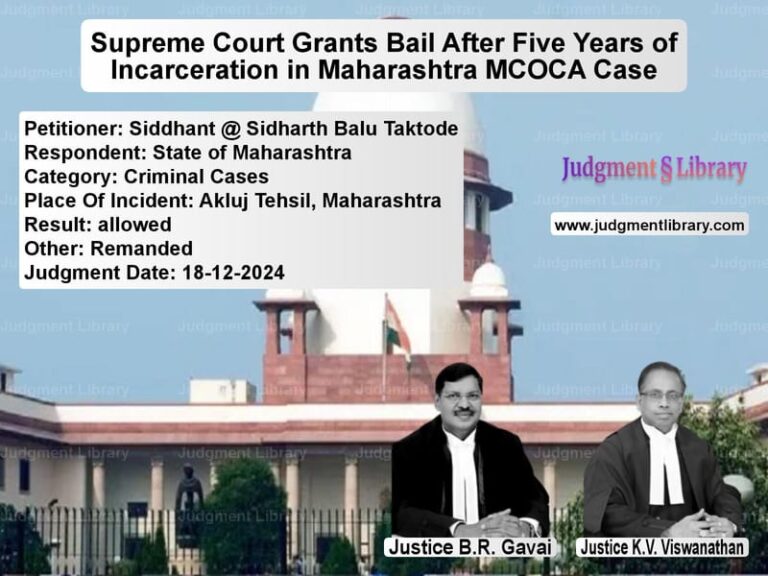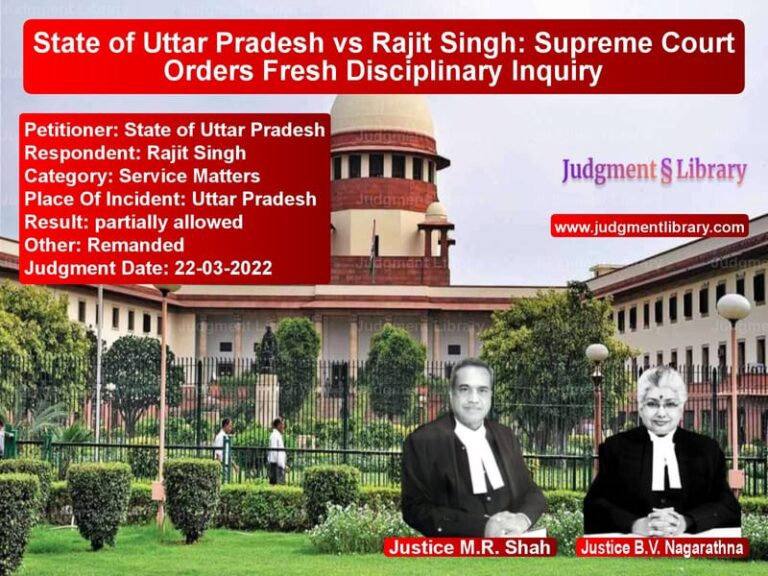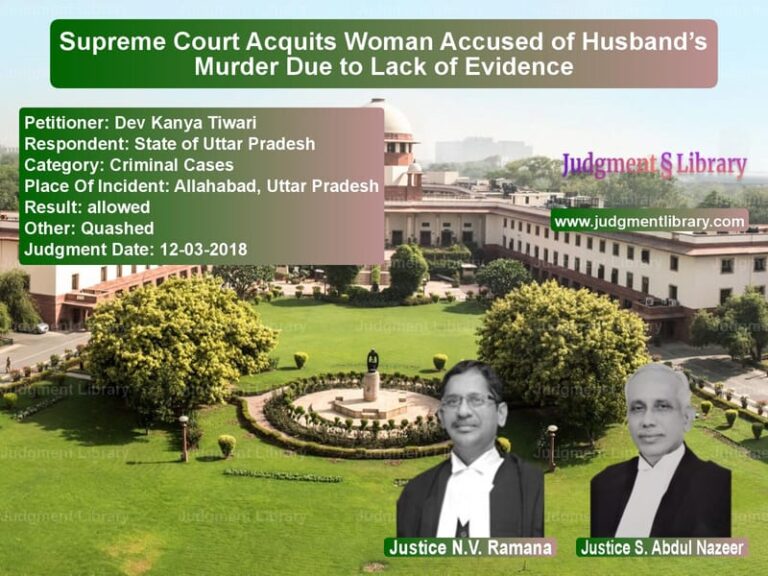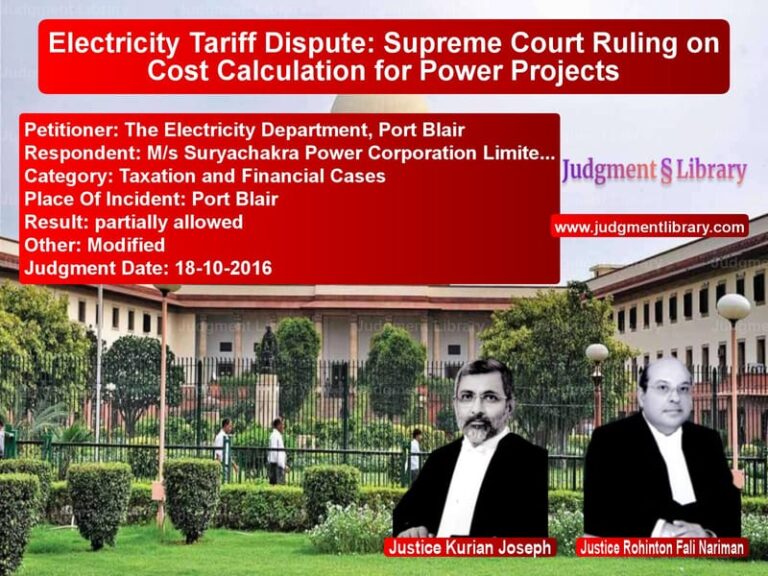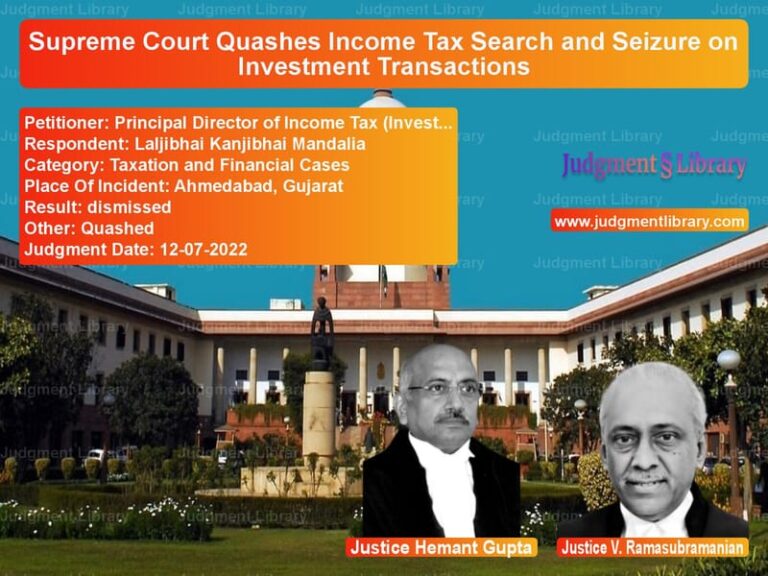Understanding the Constitutional Validity of Jharkhand’s Local Resident Reservation Policy for Public Employment
In a significant judgment, the Supreme Court of India dealt with the constitutional validity of the reservation policy introduced by the State of Jharkhand, which made 100% reservation for local residents in the Thirteen Scheduled Areas of the State for certain public employment positions. The petitioners, who were candidates from Non-Scheduled Areas, challenged this reservation policy, which they argued violated Articles 14, 16(2), and 35 of the Constitution of India. The case was rooted in the conflict between promoting local employment opportunities for Scheduled Areas and ensuring equality of opportunity for all citizens.
The appeal arose from the decision of the Jharkhand High Court, which had earlier declared the State’s policy unconstitutional, finding that the reservation violated the fundamental rights guaranteed under the Constitution. This blog post will explore the arguments of both the petitioners and the respondents, the legal reasoning employed by the Court, and the final outcome of the case.
Background of the Case
The dispute before the Supreme Court stemmed from the Jharkhand government’s Notification No. 5938 and Order No. 5939, which mandated that only local residents from the Thirteen Scheduled Areas would be eligible to apply for Class III and Class IV posts within those districts. The notification aimed at improving employment prospects for the local tribal population, which had been facing significant social and economic challenges. However, candidates from Non-Scheduled Areas who were barred from applying for these positions raised concerns about the constitutionality of such a reservation, arguing that it was discriminatory and violated the equality provisions of the Constitution.
The Petitioner’s Arguments
The petitioners, primarily candidates from the Non-Scheduled Districts, argued that the State’s reservation policy was a clear violation of the principles of equality enshrined under Article 14 of the Constitution. They contended that the 100% reservation for local residents in Scheduled Areas discriminated against candidates based solely on their place of birth or residence, which, they argued, was impermissible under the Constitution. The petitioners referred to earlier judgments, including the landmark case of Indra Sawhney, which limited the extent of reservation to 50%. They also invoked the provisions of Articles 16(1) and 16(2), asserting that no individual should be ineligible for employment in public office solely on the grounds of residence.
The petitioners emphasized that the Governor’s power to issue such reservations under Paragraph 5(1) of the Fifth Schedule of the Constitution was not intended to override the constitutional guarantees of equality before the law. They argued that while the State had the right to enact policies for the upliftment of backward areas, this should not come at the cost of denying equal opportunity to other citizens, particularly when there was no compelling reason to justify such a complete exclusion of candidates from other regions.
The Respondent’s Arguments
On the other hand, the State of Jharkhand, supported by successful candidates from the Scheduled Areas, defended the reservation policy. They argued that the Governor’s power under Paragraph 5 of the Fifth Schedule was fully constitutional and that the 100% reservation was a legitimate measure aimed at addressing the severe socio-economic disadvantages faced by local residents in the Scheduled Areas. The respondents argued that the local residents were entitled to special treatment due to the long-standing historical and geographical disadvantages they faced, which included lower human development indices, poverty, and backwardness.
The respondents also argued that the Governor, under Paragraph 5 of the Fifth Schedule, had the constitutional authority to determine eligibility for public employment in these areas. They further claimed that the policy of reserving jobs for local residents was aimed at providing better educational and employment opportunities for the tribal population, thereby enhancing their social and economic conditions.
The Court’s Analysis
The Supreme Court closely examined the powers conferred on the Governor by Paragraph 5 of the Fifth Schedule of the Constitution, which allows the Governor to make laws regarding the administration of Scheduled Areas. The Court noted that while the Governor had the power to modify laws in relation to Scheduled Areas, this power could not be exercised in a manner that violated fundamental rights guaranteed under Part III of the Constitution.
The Court cited previous judgments, including the case of Chebrolu Leela Prasad Rao, where it was held that 100% reservation for any category, including local residents, was unconstitutional. The Court reaffirmed that the reservation could not exceed the 50% limit as established in the Indra Sawhney case, which placed a cap on reservations in public employment. The Court also observed that the reservation policy in Jharkhand was discriminatory and violated the rights of candidates from Non-Scheduled Areas.
The Judgment
Ultimately, the Supreme Court upheld the High Court’s judgment, declaring the State’s policy of 100% reservation for local residents in Scheduled Areas to be unconstitutional. The Court held that such a policy violated Articles 14 and 16(2) of the Constitution, which guarantee equality of opportunity in public employment. The Court also ruled that the Governor’s powers under Paragraph 5 of the Fifth Schedule did not extend to making such an exclusionary policy.
However, in a significant departure from the High Court’s decision, the Supreme Court did not order the immediate removal of candidates already appointed under the contested reservation policy. The Court noted that to ensure that schools in Scheduled Areas did not suffer from a shortage of teachers, the appointments already made should not be disturbed. Instead, the Court directed the State to revise the merit list based on the already published cut-off and to allow candidates from both Scheduled and Non-Scheduled Areas to apply for the vacant positions based on their merit.
Conclusion
This judgment underscores the delicate balance that must be struck between promoting the welfare of disadvantaged groups and ensuring equal opportunities for all citizens. While the Court recognized the need for special provisions for Scheduled Areas, it reaffirmed that such provisions must not violate the fundamental rights of other citizens. The Court’s direction to revise the merit list and allow a fair selection process for all candidates, regardless of their place of residence, is a significant step towards ensuring both fairness and social justice.
Petitioner Name: Satyajit Kumar & Ors..Respondent Name: The State of Jharkhand & Ors..Judgment By: Justice M.R. Shah, Justice B.V. Nagarathna.Place Of Incident: Jharkhand.Judgment Date: 02-08-2022.
Don’t miss out on the full details! Download the complete judgment in PDF format below and gain valuable insights instantly!
Download Judgment: satyajit-kumar-&-ors-vs-the-state-of-jharkha-supreme-court-of-india-judgment-dated-02-08-2022.pdf
Directly Download Judgment: Directly download this Judgment
See all petitions in Fundamental Rights
See all petitions in Constitution Interpretation
See all petitions in Public Interest Litigation
See all petitions in Legislative Powers
See all petitions in Separation of Powers
See all petitions in Judgment by Mukeshkumar Rasikbhai Shah
See all petitions in Judgment by B.V. Nagarathna
See all petitions in dismissed
See all petitions in supreme court of India judgments August 2022
See all petitions in 2022 judgments
See all posts in Constitutional Cases Category
See all allowed petitions in Constitutional Cases Category
See all Dismissed petitions in Constitutional Cases Category
See all partially allowed petitions in Constitutional Cases Category


